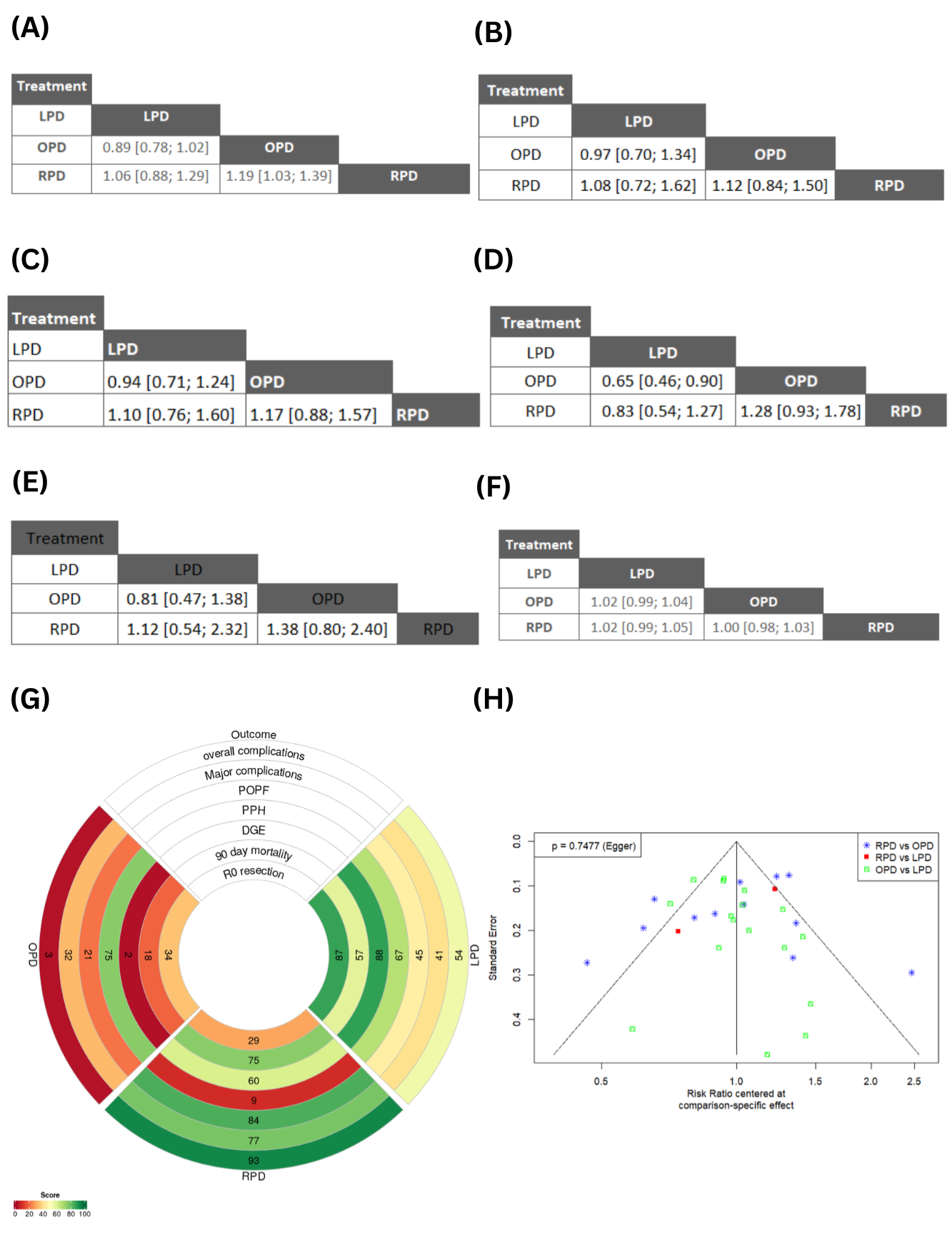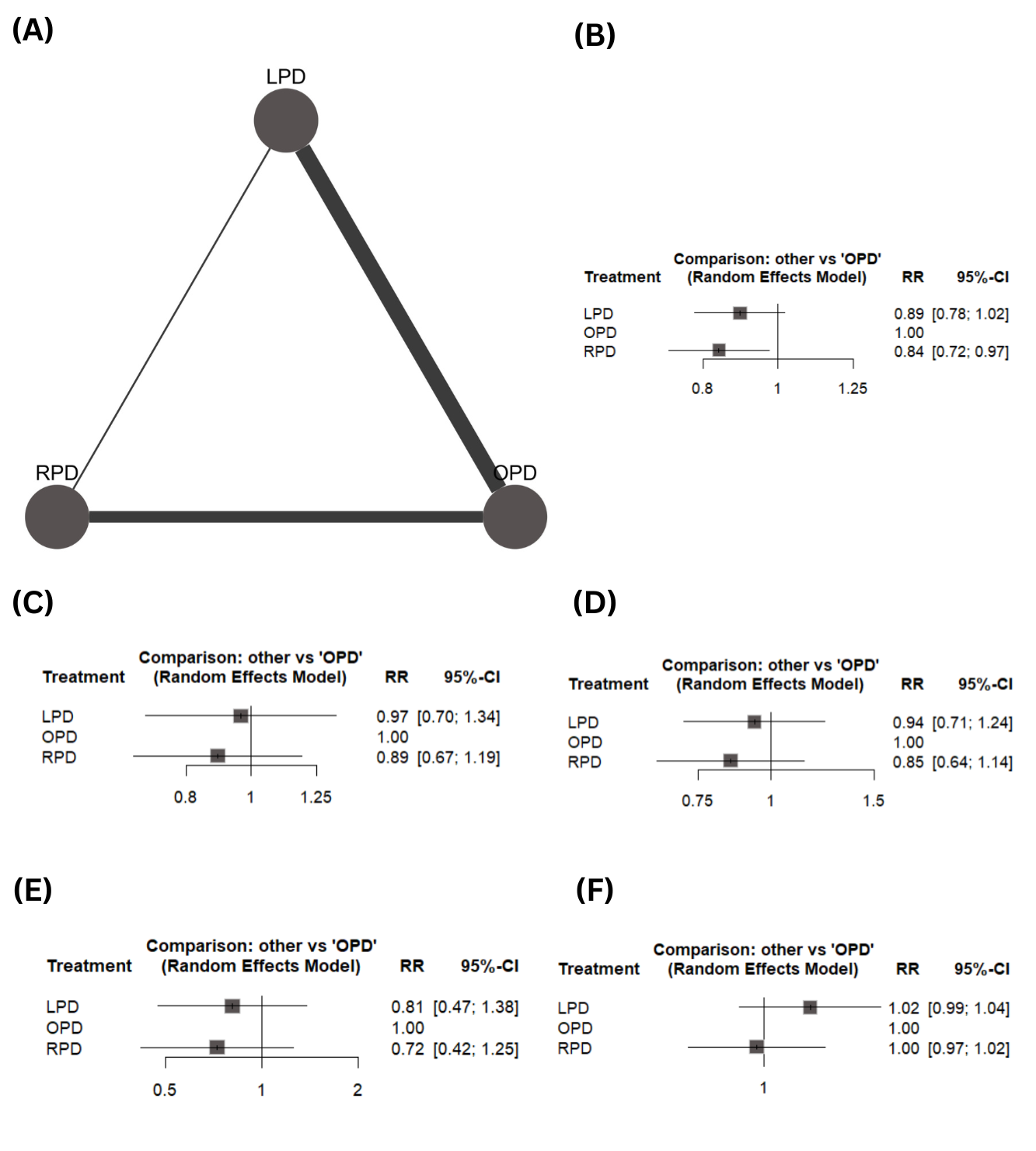Tuesday Poster Session
Category: Interventional Endoscopy
P5686 - Comparing Robotic, Laparoscopic and Open Pancreaticoduodenectomy: A Systematic Review and Network Meta-Analysis of Randomized Controlled Trials and Propensity-Matched Studies
Tuesday, October 28, 2025
10:30 AM - 4:00 PM PDT
Location: Exhibit Hall

Khadija Mohib, MD (she/her/hers)
Kirk Kerkorian School of Medicine at the University of Nevada Las Vegas
Las Vegas, NV
Presenting Author(s)
Noor Ul Huda Ramzan, MD1, Sabah Mohib, MBBS2, Zain Ul Abideen, MBBS3, Muhammad Hassan Waseem, MBBS4, Sania Aimen, MBBS5, Khadija Mohib, MD6, Mian Uman Anwer, MBBS7, Prasun K.. Jalal, MD8, Abu-Bakr Ahmed, BA6
1University of Texas Southwestern Medical Center, Dallas, TX; 2Dow Medical College, Reseda, CA; 3King Edward Medical University, Lahore, Punjab, Pakistan; 4Allama Iqbal Medical College, Lahore, Punjab, Pakistan; 5Quetta Institute of Medical Sciences, Quetta, Balochistan, Pakistan; 6Kirk Kerkorian School of Medicine at the University of Nevada Las Vegas, Las Vegas, NV; 7Punjab Medical College, Faisalabad, Punjab, Pakistan; 8Baylor College of Medicine, Houston, TX
Introduction: Pancreaticoduodenectomy is a complicated procedure with a high risk of morbidity and mortality. This network meta-analysis compared the robotic (RPD), laparoscopic (LPD) and open (OPD) approaches for pancreaticoduodenectomy.
Methods: PubMed, Cochrane Central and ScienceDirect were searched from inception till January 2025. A frequentist network meta-analysis was performed using the R version 4.2.1 and employing the “netmeta” package. Risk ratios (RR) with a 95 % Confidence interval were pooled under the random effects model for the dichotomous outcomes. The treatment ranking was calculated using the p-scores. The quality of the included studies was evaluated using the Cochrane Rob 2 tool and the New-castle Ottawa Scale, while the publication bias was assessed using the funnel plots.
Results: Fifty-five studies were included in the final meta-analysis. Compared with OPD, RPD significantly decreased the risk of overall complications (RR=0.84, 95% CI: [0.72, 0.97). The risk of major complications was lowest in the RPD (p-score=0.95) and highest in the OPD group (0.13). RPD also had the lowest risk of postoperative pancreatic fistula rate (POPF) (0.42), while the risk of delayed gastric emptying (DGE) was lowest in the LPD group (p-score=1.0). The R0 resection rate was highest in the LPD (0.72) and lowest in the RPD group (0.39). Regarding 90-day mortality, RPD had the lowest risk (p-score=0.72).
Discussion: RPD demonstrates a lower risk of overall complications and postoperative pancreatic fistula compared to OPD, while LPD has a lower risk of delayed gastric emptying and higher R0 resection rates. Both RPD and LPD offer promising outcomes, with RPD showing the most favourable results in reducing 90-day mortality.

Figure: Figure 1: (A)Overall Complications Network Graph (B)Overall Complications Forest Plot (C)Major Complications Forest Plot (D)Postoperative Pancreatic Fistula Forest Plot (E) 90 day Mortality Forest Plot (F)R0 Resection Forest Plot

Figure: Figure 2: (A)Overall Complications League Table (B)Major Complications League Table (C)Postoperative Pancreatic Fistula League Table (D)Delayed Gastric Emptying League Table (E)90 day Mortality League Table (F)R0 Resection League Table (G)Rank Heat Plot for Treatment Ranking (H)Overall Complications Funnel Plot
Disclosures:
Noor Ul Huda Ramzan indicated no relevant financial relationships.
Sabah Mohib indicated no relevant financial relationships.
Zain Ul Abideen indicated no relevant financial relationships.
Muhammad Hassan Waseem indicated no relevant financial relationships.
Sania Aimen indicated no relevant financial relationships.
Khadija Mohib indicated no relevant financial relationships.
Mian Uman Anwer indicated no relevant financial relationships.
Prasun Jalal: AbbVie – Consultant. Gilead Sciences – Consultant.
Abu-Bakr Ahmed indicated no relevant financial relationships.
Noor Ul Huda Ramzan, MD1, Sabah Mohib, MBBS2, Zain Ul Abideen, MBBS3, Muhammad Hassan Waseem, MBBS4, Sania Aimen, MBBS5, Khadija Mohib, MD6, Mian Uman Anwer, MBBS7, Prasun K.. Jalal, MD8, Abu-Bakr Ahmed, BA6. P5686 - Comparing Robotic, Laparoscopic and Open Pancreaticoduodenectomy: A Systematic Review and Network Meta-Analysis of Randomized Controlled Trials and Propensity-Matched Studies, ACG 2025 Annual Scientific Meeting Abstracts. Phoenix, AZ: American College of Gastroenterology.
1University of Texas Southwestern Medical Center, Dallas, TX; 2Dow Medical College, Reseda, CA; 3King Edward Medical University, Lahore, Punjab, Pakistan; 4Allama Iqbal Medical College, Lahore, Punjab, Pakistan; 5Quetta Institute of Medical Sciences, Quetta, Balochistan, Pakistan; 6Kirk Kerkorian School of Medicine at the University of Nevada Las Vegas, Las Vegas, NV; 7Punjab Medical College, Faisalabad, Punjab, Pakistan; 8Baylor College of Medicine, Houston, TX
Introduction: Pancreaticoduodenectomy is a complicated procedure with a high risk of morbidity and mortality. This network meta-analysis compared the robotic (RPD), laparoscopic (LPD) and open (OPD) approaches for pancreaticoduodenectomy.
Methods: PubMed, Cochrane Central and ScienceDirect were searched from inception till January 2025. A frequentist network meta-analysis was performed using the R version 4.2.1 and employing the “netmeta” package. Risk ratios (RR) with a 95 % Confidence interval were pooled under the random effects model for the dichotomous outcomes. The treatment ranking was calculated using the p-scores. The quality of the included studies was evaluated using the Cochrane Rob 2 tool and the New-castle Ottawa Scale, while the publication bias was assessed using the funnel plots.
Results: Fifty-five studies were included in the final meta-analysis. Compared with OPD, RPD significantly decreased the risk of overall complications (RR=0.84, 95% CI: [0.72, 0.97). The risk of major complications was lowest in the RPD (p-score=0.95) and highest in the OPD group (0.13). RPD also had the lowest risk of postoperative pancreatic fistula rate (POPF) (0.42), while the risk of delayed gastric emptying (DGE) was lowest in the LPD group (p-score=1.0). The R0 resection rate was highest in the LPD (0.72) and lowest in the RPD group (0.39). Regarding 90-day mortality, RPD had the lowest risk (p-score=0.72).
Discussion: RPD demonstrates a lower risk of overall complications and postoperative pancreatic fistula compared to OPD, while LPD has a lower risk of delayed gastric emptying and higher R0 resection rates. Both RPD and LPD offer promising outcomes, with RPD showing the most favourable results in reducing 90-day mortality.

Figure: Figure 1: (A)Overall Complications Network Graph (B)Overall Complications Forest Plot (C)Major Complications Forest Plot (D)Postoperative Pancreatic Fistula Forest Plot (E) 90 day Mortality Forest Plot (F)R0 Resection Forest Plot

Figure: Figure 2: (A)Overall Complications League Table (B)Major Complications League Table (C)Postoperative Pancreatic Fistula League Table (D)Delayed Gastric Emptying League Table (E)90 day Mortality League Table (F)R0 Resection League Table (G)Rank Heat Plot for Treatment Ranking (H)Overall Complications Funnel Plot
Disclosures:
Noor Ul Huda Ramzan indicated no relevant financial relationships.
Sabah Mohib indicated no relevant financial relationships.
Zain Ul Abideen indicated no relevant financial relationships.
Muhammad Hassan Waseem indicated no relevant financial relationships.
Sania Aimen indicated no relevant financial relationships.
Khadija Mohib indicated no relevant financial relationships.
Mian Uman Anwer indicated no relevant financial relationships.
Prasun Jalal: AbbVie – Consultant. Gilead Sciences – Consultant.
Abu-Bakr Ahmed indicated no relevant financial relationships.
Noor Ul Huda Ramzan, MD1, Sabah Mohib, MBBS2, Zain Ul Abideen, MBBS3, Muhammad Hassan Waseem, MBBS4, Sania Aimen, MBBS5, Khadija Mohib, MD6, Mian Uman Anwer, MBBS7, Prasun K.. Jalal, MD8, Abu-Bakr Ahmed, BA6. P5686 - Comparing Robotic, Laparoscopic and Open Pancreaticoduodenectomy: A Systematic Review and Network Meta-Analysis of Randomized Controlled Trials and Propensity-Matched Studies, ACG 2025 Annual Scientific Meeting Abstracts. Phoenix, AZ: American College of Gastroenterology.
